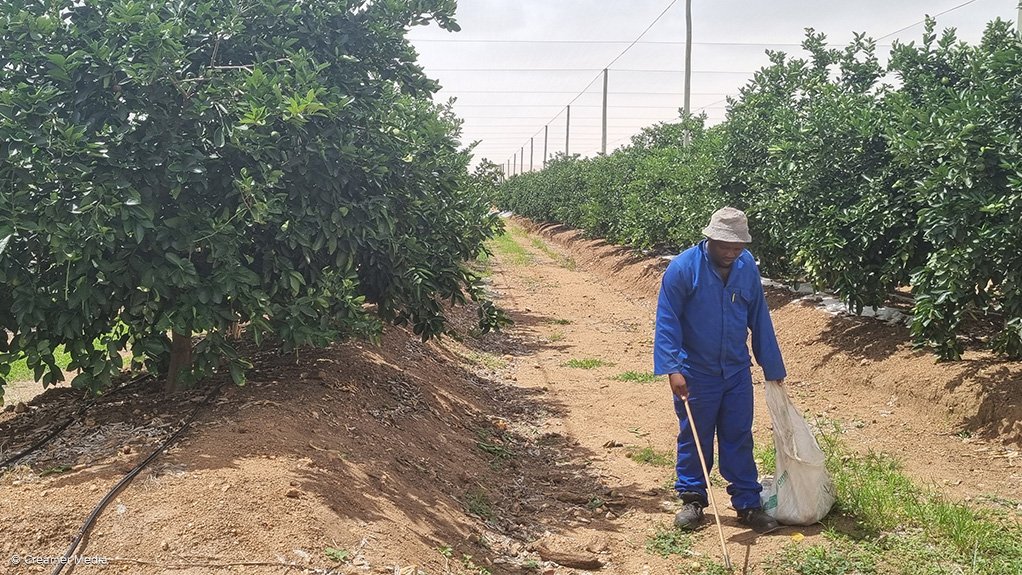First-quarter agriculture sentiment largely influenced by drought, public infrastructure deterioration
The Agricultural Business Chamber (Agbiz) and Industrial Development Corporation’s Agribusiness Confidence Index (ACI) has remained unchanged in the first quarter of the year at a level of 40.
This followed a deterioration of ten points to 40 in the fourth quarter of last year.
The ACI remains below the neutral 50-point mark, which implies that South African agribusinesses remain downbeat about business conditions, mostly owing to persistent port issues, poor rail infrastructure and worsening municipal service delivery.
Other factors such as the El Niño-induced drought devastating summer grains and oilseeds in some regions; rising crime rates; lingering animal disease challenges; persistent loadshedding; and the uncertain policy environment ahead of elections, also continue to weigh on sentiment.
Three of the ACI subindices declined in the first quarter of the year, with the rest showing mild improvement.
The turnover subindex was down by 14 points to 52 in the reporting quarter, which reflects an environment where input costs remain relatively elevated and with expectations that summer grain and oilseed harvests will be lower.
The volume of export subindex fell by seven points to 35 in the first quarter of the year, which signals the potential decline in export volumes this year – from a record $13.2-billion of exports in 2023.
The general agricultural conditions subindex decreased by 22 points to a level of 18 in the first quarter, which mirrors the damage the heatwave and dryness since February has caused in the summer grain and oilseed-producing regions of South Africa. This level was last recorded in the first quarter of 2016.
Positively, the net operating income subindex improved by one point from the prior quarter to 48 in the reporting quarter, while the market share of agribusinesses subindex increased by six points to 59.
The employment subindex was up by three points to a level of 50 in the first quarter of the year, which Agbiz says is surprising given the current challenging agricultural production levels.
It is possible that employers’ views were influenced by the robust results of the fourth quarter of 2023, where 920 000 people were employed in primary agriculture – compared with the long-term average of 793 000, it notes.
The capital investments subindex improved by seven points to 50 in the first quarter, which Agbiz says reflects the investments in alternative energy sources, as the sector continues to invest in mitigating against the effects of loadshedding.
The general economic conditions subindex also managed to recover by 20 points to 30 in the period, which is still below the neutral mark but points to expectations that loadshedding may reduce this year.
The debtor provision for bad debt was down by nine points to 27 in the first quarter, which is a favourable development. However, financing costs increased by 14 points to 27, signalling that agricultural firms are still worried about higher interest rates in an industry where farm debt is already more than R200-billion.
Agbiz chief economist Wandile Sihlobo comments that after years of solid activity, South Africa’s agriculture sector faces a daunting year ahead.
He adds that although weather-related risks are a major concern in the year ahead, there remain aspects that policymakers, together with the private sector, can tackle to unlock more long-term growth potential for the sector.
These include addressing weakening municipalities and service delivery, deteriorating roads, animal disease management measures, efficiency in the registration of new agrochemicals and seeds, rising crime, inefficient logistics and loadshedding.
“With the elections ahead, it is unclear if there will be a serious focus on policy matters in the months ahead,” Sihlobo concludes.
Article Enquiry
Email Article
Save Article
Feedback
To advertise email advertising@creamermedia.co.za or click here
Announcements
What's On
Subscribe to improve your user experience...
Option 1 (equivalent of R125 a month):
Receive a weekly copy of Creamer Media's Engineering News & Mining Weekly magazine
(print copy for those in South Africa and e-magazine for those outside of South Africa)
Receive daily email newsletters
Access to full search results
Access archive of magazine back copies
Access to Projects in Progress
Access to ONE Research Report of your choice in PDF format
Option 2 (equivalent of R375 a month):
All benefits from Option 1
PLUS
Access to Creamer Media's Research Channel Africa for ALL Research Reports, in PDF format, on various industrial and mining sectors
including Electricity; Water; Energy Transition; Hydrogen; Roads, Rail and Ports; Coal; Gold; Platinum; Battery Metals; etc.
Already a subscriber?
Forgotten your password?
Receive weekly copy of Creamer Media's Engineering News & Mining Weekly magazine (print copy for those in South Africa and e-magazine for those outside of South Africa)
➕
Recieve daily email newsletters
➕
Access to full search results
➕
Access archive of magazine back copies
➕
Access to Projects in Progress
➕
Access to ONE Research Report of your choice in PDF format
RESEARCH CHANNEL AFRICA
R4500 (equivalent of R375 a month)
SUBSCRIBEAll benefits from Option 1
➕
Access to Creamer Media's Research Channel Africa for ALL Research Reports on various industrial and mining sectors, in PDF format, including on:
Electricity
➕
Water
➕
Energy Transition
➕
Hydrogen
➕
Roads, Rail and Ports
➕
Coal
➕
Gold
➕
Platinum
➕
Battery Metals
➕
etc.
Receive all benefits from Option 1 or Option 2 delivered to numerous people at your company
➕
Multiple User names and Passwords for simultaneous log-ins
➕
Intranet integration access to all in your organisation





















